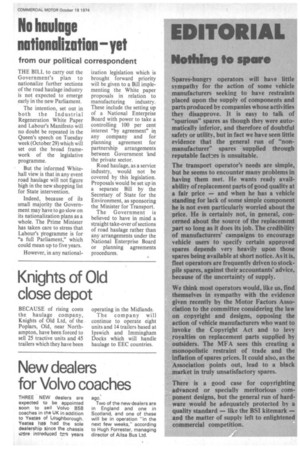Nothing to spare
Page 19

If you've noticed an error in this article please click here to report it so we can fix it.
ares-hungrv operators will have little sympathy for the action or some vehicle manufacturers seeking to have restraints placed upon the simply of components and parts produced by companies vvhose activities they disapprove. It is easy to talk of "spurious" spares as though they were automatically inferior, and therefore of doubtful safety or utility, but in fact we have seen little evidence that the general run of "nonmanufacturer" spares !graphed through reputable factors is unsuitable.
The transport operator's needs are simple, but he seems to encounter many problems in having them met. He wants ready availability of replacement parts of good otialitv at fair price -and when he has a vehicle standing for lack of some simple component he is riot even particularly worried about the ice. He is certainly not, in general, concerned about the source of the replacement art so long as it does its iob. The credibility of manufacturers ampaigns to encourage vehicle users to specify certain approved spares depends very heavily upon those spares being available at short notice. As it is, fleet operators are frequently driven to stockpile spares, against their accountants advice, because of the uncertainty of supply.
We think most operators would, like us. find themselves in syinpathy with the evidence given recently by the Motor Factors Association to the committee considering the law on copyright and designs, opposing the ction of vehicle manufacturers who want to lifiVok e the Copyright Ad and to levy royalties on replacement parts supplied by outsiders. The MFA sees this creating a onopolistic restraint of trade and the ation of spares prices. It could also, as the Association points out, lead to a black market in truly unsatisfactory spares.
There es a good case for copyrighting
advanced specially nieritorious component designs, but the general run of hardware would be adequately protected by a quality standard — like the ICSI kitetnark — and the matter of supply left to enlightened commercial competition.




































































































